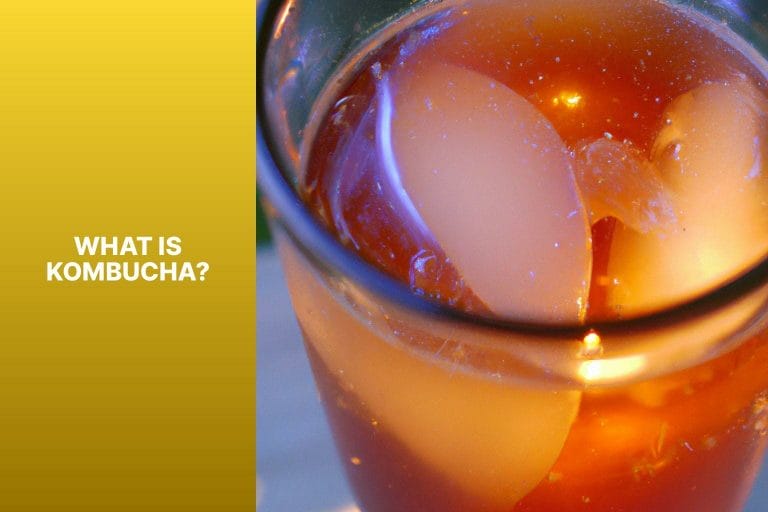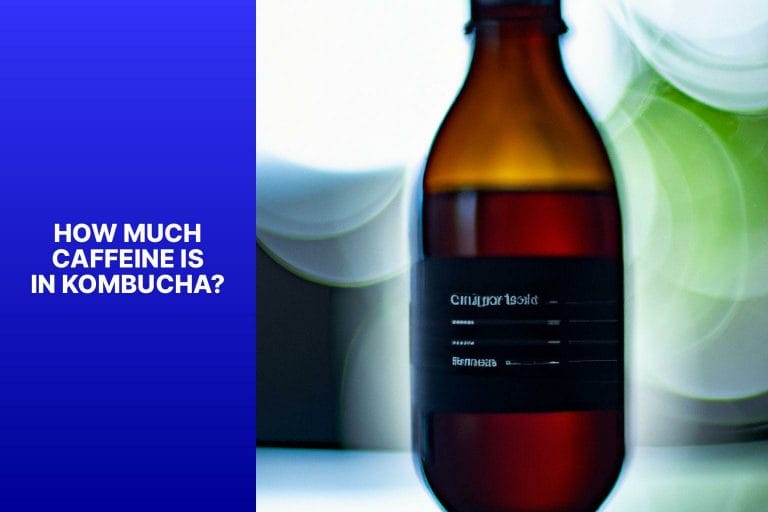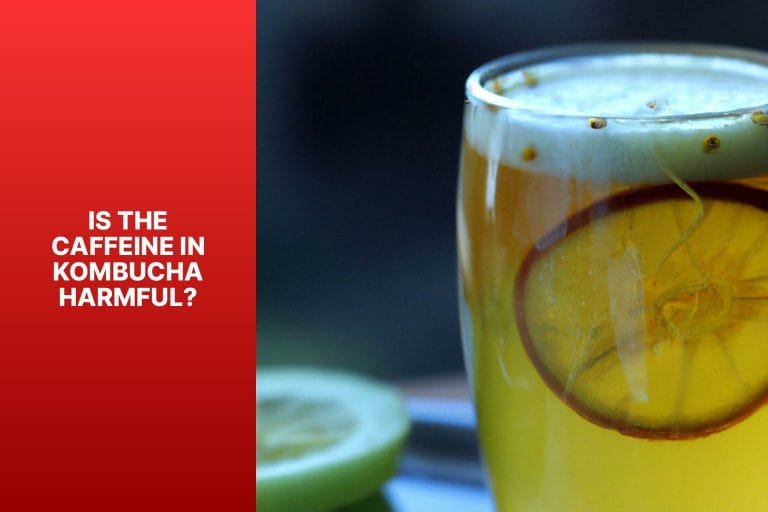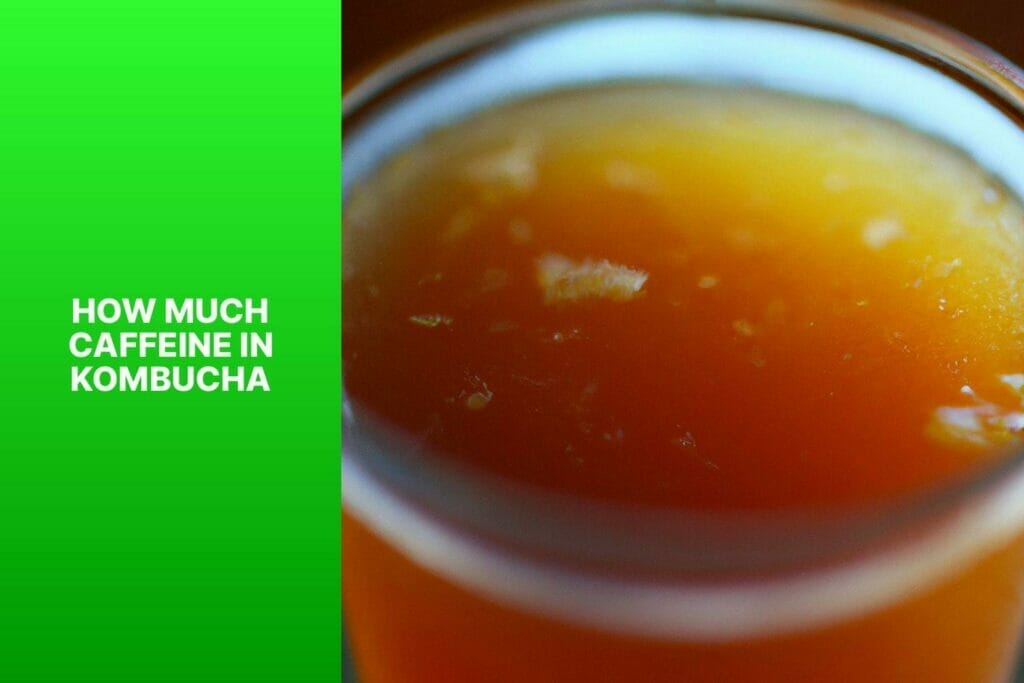Kombucha, a fermented tea beverage gaining popularity recently, is known for its unique taste and potential health benefits.
But how much caffeine does kombucha contain?
In this article, we will explore the caffeine content of kombucha and its implications for consumers.
First, let’s understand what kombucha is and how it is made. Kombucha is a fermented beverage made from black or green tea, sugar, and a symbiotic culture of bacteria and yeast (SCOBY).
During fermentation, the sugar is converted into organic acids, carbon dioxide, and small amounts of alcohol.
Caffeine, a natural stimulant found in tea and coffee, is known for its energizing effects on the body.
The caffeine content in kombucha can vary depending on several factors, including the type of tea used, fermentation time, and brewing technique.
While kombucha is generally considered a low-caffeine beverage, it does contain some caffeine due to the tea used as its base.
The exact caffeine content in kombucha can vary widely, ranging from negligible amounts to around 25 milligrams per 8-ounce serving.
It is important to note that the caKombucha’s caffeine content is significantly lower thane traditional tea.
Next, we will explore the factors that can influence the caffeine content of kombucha, the potential health effects of consuming caffeine, and who should be cautious about consuming kombucha with caffeine.
We will also discuss whether choosing kombucha with lower caffeine content is possible.
By providing accurate information about the caffeine content in kombucha, consumers can make informed choices about including it in their diet.
Key takeaway:
- Kombucha is a fermented tea drink that may contain caffeine.
- The caffeine content in kombucha can vary depending on brewing time, tea type, and fermentation process.
- While kombucha generally contains less caffeine than coffee or traditional tea, those sensitive to caffeine should be cautious when consuming kombucha.
What is Kombucha?

Photo Credits: Standardkombucha.Com by Paul Williams
Kombucha is a fermented tea drink made with tea, sugar, and a SCOBY (Symbiotic Culture of Bacteria and Yeast). It is renowned for its potential health benefits and is enjoyed worldwide.
The SCOBY ferments the tea, transforming it into a tangy and slightly fizzy beverage.
When purchasing kombucha, it is advisable to opt for brands that employ high-quality ingredients and organic teas as they offer superior taste and potential health advantages.
How is Kombucha Made?
Kombucha is fermented with tea, sugar, and a SCOBY (Symbiotic Culture of Bacteria and Yeast). Here’s a step-by-step guide on how kombucha is made:
- Brew tea: Use black or green tea leaves and steep them in boiling water to extract flavor and caffeine.
- Add sugar: Dissolve sugar in the brewed tea to provide food for the SCOBY.
- Cool tea: Let the tea cool to room temperature to avoid SCOBY damage.
- Add SCOBY: Put the rubbery SCOBY culture into the cooled tea.
- Fermentation: Cover the container and let the tea ferment for 7-14 days. The SCOBY consumes sugar and produces organic acids and carbon dioxide.
- Second fermentation (optional): Flavor or carbonate the kombucha by adding fruits, herbs, or spices and letting it sit for a few more days.
- Bottle and refrigerate: Strain the desired kombucha, bottle it, and refrigerate to slow fermentation and preserve taste.
A friend found joy in making kombucha at home. She tried different tea blends, flavors, and sweeteners, creating unique combinations her family and friends loved.
They appreciated the health benefits, and homemade kombucha became a household staple, with others eager to try her flavorful creations.
What is Caffeine?
Caffeine is a natural stimulant in coffee beans, tea leaves, and cacao. It blocks adenosine receptors in the central nervous system, increasing alertness and reducing fatigue.
On average, a cup of coffee contains 95 milligrams of caffeine, while a cup of tea has around 47 milligrams.
Energy drinks, on the other hand, can have higher amounts of caffeine, ranging from 70 to 200 milligrams per serving.
The effects of caffeine can vary depending on an individual’s tolerance and sensitivity. Some people may experience an increased heart rate or difficulty sleeping when consuming high amounts of caffeine.
Therefore, it is recommended to consume caffeine in moderation and to be aware of its presence in chocolate and certain medications.
Certain plants produce caffeine as a natural pesticide to protect themselves against insects.”
Does Kombucha Contain Caffeine?
Kombucha is known to contain caffeine, but the amount can vary depending on factors such as the brewing process and the type of tea used. An 8-ounce serving of kombucha typically contains about 15-30 milligrams of caffeine.
Notably, this caffeine content is significantly lower than in coffee or tea. A cup of coffee, for instance, can contain anywhere from 95-165 milligrams of caffeine.
Kombucha can be a good choice for a beverage with lower caffeine levels. If you are sensitive to caffeine or trying to avoid it, it is advisable to check the specific brand or variety of kombucha, as the caffeine content may vary.
How Much Caffeine is in Kombucha?

Photo Credits: Standardkombucha.Com by Ralph Nelson
Kombucha is a beverage that undergoes fermentation and is known for its potential health benefits.
The amount of caffeine in kombucha can vary depending on factors such as the type of tea used and the fermentation process employed.
Generally, kombucha contains less caffeine than coffee, typically ranging from 15-30 milligrams per 8-ounce serving.
It is important to note that different brands may offer slightly different caffeine content, so reviewing the label or contacting the manufacturer for accurate information is recommended.
Some brands may also provide caffeine-free options or have reduced caffeine content.
Ultimately, when determining the caffeine content in kombucha, it is advisable to consider your caffeine tolerance and preferences.
What Factors Affect the Caffeine Content of Kombucha?
Factors Affecting Kombucha’s Caffeine Content
Several factors affect the caffeine content in Kombucha:
1. Tea type: Kombucha traditionally uses black tea, which has higher caffeine levels than other teas. Using green or white tea reduces the caffeine content.
2. Fermentation duration: Longer fermentation breaks down more caffeine. Longer times result in lower caffeine content.
3. Brewing temperature: Higher temperatures speed up caffeine degradation. Lower temperatures result in lower caffeine content.
4. Tea-to-water ratio: Using more tea leaves increases the caffeine content.
5. Fermentation conditions: pH levels, oxygen exposure, and additives affect yeasts and bacteria, which impact caffeine breakdown.
To choose lower-caffeine kombucha, look for brands advertising reduced caffeine or those using low-caffeine teas.
Homemade kombucha allows experimentation with different factors. Always check the label or contact the manufacturer for specific caffeine information.
Is the Caffeine in Kombucha Harmful?

Photo Credits: Standardkombucha.Com by Alexander Nguyen
The caffeine in kombucha is generally safe as levels are low and within safe limits. Consider the following facts:
1. Kombucha typically contains 15-30 milligrams of caffeine per 8-ounce serving, much less than a cup of coffee.
2. Moderate caffeine consumption from kombucha is not associated with negative health effects for most people. Individuals sensitive to caffeine or certain health conditions may need to limit intake.
3. Caffeine in Kombucha can mildly boost energy and enhance mental alertness, similar to other caffeinated drinks.
4. Kombucha is known for its potential health benefits, such as probiotics and antioxidants, rather than its caffeine content.
What Are the Health Effects of Consuming Caffeine?
Caffeine is a stimulant found in coffee, tea, energy drinks, and some soft drinks, and it has various health effects depending on the individual and the amount consumed.
Consuming caffeine increases alertness and reduces fatigue, promoting wakefulness and enhancing focus. It also improves performance in physical activities and mental tasks, enhancing endurance, reaction time, and cognitive function.
Additionally, caffeine boosts metabolism and increases fat burning, mobilizing fatty acids for energy and improving physical performance.
It enhances mood, cognitive performance, and feelings of well-being, along with improving concentration and memory.
Consuming caffeine late in the day can interfere with sleep, disrupting sleep quality and causing difficulty falling or staying asleep.
Regular caffeine consumption can lead to dependence, with withdrawal symptoms like headaches, irritability, and fatigue occurring when caffeine intake is abruptly stopped.
It is worth noting that the effects of caffeine can vary among individuals, with some people being more sensitive to its effects and others developing tolerance with prolonged use.
Limiting caffeine intake to moderate levels, up to 400 mg daily, is recommended for most healthy adults.
If you are sensitive to caffeine or have specific health concerns, it is advisable to consult with a healthcare professional to determine the appropriate amount of caffeine for you.
Who Should Be Cautious about Consuming Caffeine in Kombucha?
Certain groups should be cautious about consuming caffeine in kombucha. These groups include pregnant women, individuals with caffeine sensitivity, and people with certain medical conditions.
Pregnant women should limit their caffeine intake to less than 200 milligrams daily to reduce the risk of miscarriage or preterm birth.
Individuals with caffeine sensitivity may experience increased heart rate, jitters, or difficulty sleeping, so they should be cautious when consuming kombucha with caffeine.
People with anxiety disorders, insomnia, high blood pressure, or gastrointestinal disorders may find their conditions worsened by caffeine, so they should limit or avoid kombucha with caffeine.
If you fall into these categories but still want to enjoy kombucha, choose caffeine-free varieties or those with low caffeine content.
Always check the labels and select a kombucha brand that suits your needs and preferences.
Can You Choose Kombucha with Lower Caffeine Content?
Yes, you have the option to choose kombucha with lower caffeine content. Different brands and flavors of kombucha may have varying levels of caffeine.
Therefore, checking the labels or researching for a kombucha containing less caffeine is crucial.
To select kombucha with lower caffeine content, consider brands explicitly mentioning low or reduced caffeine on the label. Some brands may also offer options that are completely free of caffeine.
By choosing these varieties, you can enjoy kombucha without consuming high levels of caffeine.
It is important to note that the caffeine content in kombucha can differ depending on the type of tea used during the fermentation process. Generally, green tea kombucha has less caffeine compared to black tea kombucha.
Selecting a kombucha with lower caffeine content is suitable if you are sensitive to caffeine or wish to limit caffeine intake.
It is always advisable to consult with a healthcare professional or your doctor if you have specific concerns or dietary restrictions.
Remember, it is all about making informed decisions and finding the kombucha that aligns with your preferences and needs. So, check the labels, research, and enjoy your kombucha with lower caffeine content.
Some Facts About How Much Caffeine is in Kombucha:
- ✅ Kombucha contains probiotics, caffeine, and alcohol due to fermentation. (Source: Brew Dr. Kombucha)
- ✅ The fermentation process in kombucha reduces the caffeine in the tea, but small amounts remain in the final product. (Source: Brew Dr. Kombucha)
- ✅ A 14oz bottle of Brew Dr. Kombucha contains about 15mg of caffeine, similar to a decaf coffee cup. (Source: Brew Dr. Kombucha)
- ✅ Homemade kombucha generally contains about 10 to 15 mg of caffeine per cup, while some extra caffeinated kombucha products can have up to 90 mg per cup. (Source: Brew Buch)
- ✅ The levels of caffeine in kombucha can vary depending on the type of tea, steeping time, and fermentation process. (Source: Rise Kombucha)
